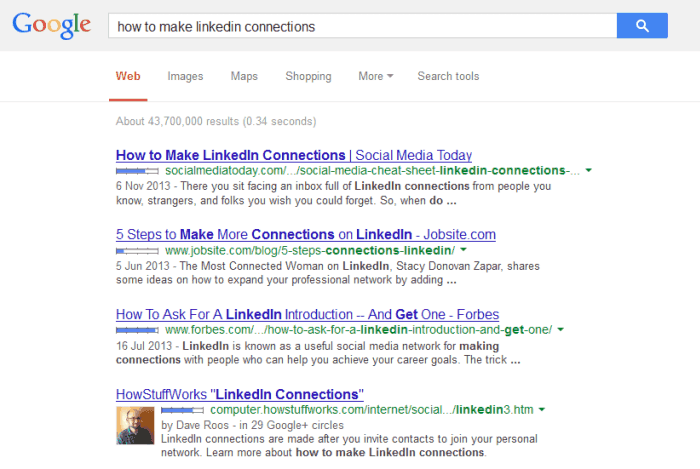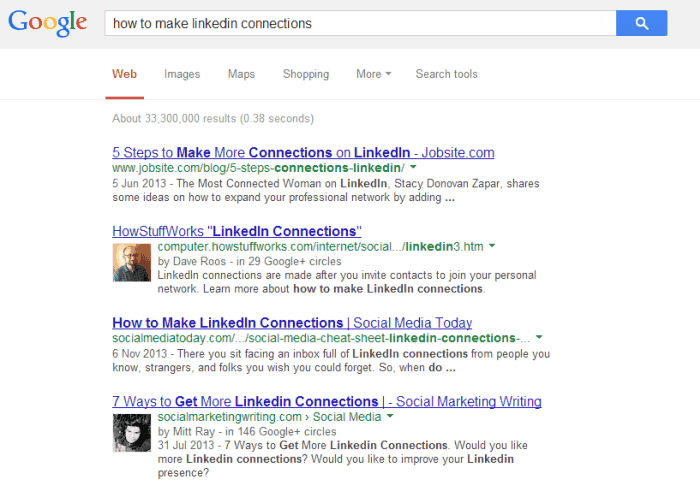Google+ does NOT help you gain higher search engine rankings. We know that because Google themselves say so. Indeed, one of their leading engineers Matt Cutts even went so far as having to debunk the widely held theory in a forum discussion.
Well that just goes to show how much Google knows about its own product.
Here’s proof that Google+ DOES affect your search engine ranking. Take a look at the two searches below:


The same search has been conducted using the same browser on the same computer within 30 seconds of each other. The top one was made when logged in to a Google account, the second was made when logged out.
Apart from the fact that the logged in search has ten million more results than the logged out account, notice the difference in the number one item offered by each results.
In the logged in version the number one result is from “socialmediatoday.com” but that is now the number three result when the same search is completed when logged out. True it is not a stellar difference, but given that something like 20 times as many people click on result number one, compared with number three, it is important.
So why were the results different?
The answer is simple. When I am logged in Google knows I follow socialmediatoday.com and LinkedIn which posted the link, which appeared on my Google+ account because I follow them.
Google is adapting the results of its search page to more closely match individual needs, using data it collects from Google+ accounts. If you follow someone, their pages are going to come higher in the search results compared with someone who you don’t connect with using Google+.
Google, of course, is correct in saying that Google+ does not affect the search engine ranking. But what it doesn’t add to that is the fact that the rankings are adapted to each individual in a bid to provide a personalised search experience.
It means that if you are not using Google+ and your competitors are, they are going to feature more highly in the search results of your customers who also use Google+.
In other words, Google have finally got you; you HAVE TO use Google+ now if you want to keep yourself in front of your target audiences when they are searching on Google.

Great exposition Graham.
I take your point and wonder if you could clarify a related point being, what do you mean when you refer to us needing to ‘use’ Google+ if our competitors are doing so?
How much ‘use’ does one need to make in this regard? Have registered? Have added people into circles? Be posting material there? Something else?
Subject to your replies on this point my view re Google+ is much the same today as it was 2 years ago. I don’t know what it is for. I have facebook for family, friends and fun. I have twitter for information and quick chats and I have linkedin for business connections and groups. Few people I know in real life are as active on social media as I am and yet they don’t even seem to know that Google+ exists, let alone understand why they might need to use it.
(I am on record as predicting that at some stage it will become the most important form of online social media – simply because it’s part of Google. Which is sort of the point you are making I guess)
Thanks Mark – sorry I didn’t explain what I mean by “use”. What the research shows is that there are search engine benefits, as I describe in the blog post, when you follow people on Google+. That means you have to engage – you have to include them in your Circles, or if they are a business page you have to follow them. It will also obviously help if this is a two-way, relationship thing. So that means simply putting people in Circles but then doing nothing about it, is unlikely to be of much practical value. It’s when Google sees engagement that the algorithm can better personalise search results. So, if your competitors engage with your potential customers using Google+ but you don’t, then you will face a comparative search engine penalty which can only be rectified with more engagement.
In other words, you are right – Google+ could become the most important form of online social media there is, if search engine ranking is important (and that is a big “if” anyway). But with Google’s dominance and the widely held theory that search engine results are fundamental (that’s a myth) then Google+ will become fundamental too.
What that really means is that all those people you know who have never heard of it or don’t use it face serious online competition issues that could be a business threat to them.
I was very dismissive of Google+ when it began and it is still poorly designed and has engineering-led rather than people-led functionality making it a pig to use unless you are an engineer. Even so, the use of Google+ to personalise search results could be the “killer” application which Google needs to reduce the dominance of Facebook.
It is the most detailed and complete list of SEO tutorial I ever had. It covers the areas of on page optimization and technical SEO. It is a great help for SEO